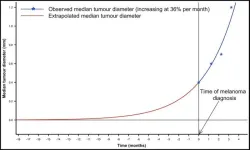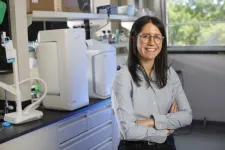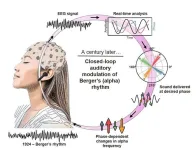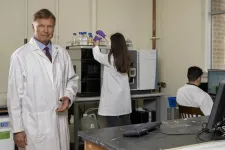(Press-News.org) When it comes to health, inequalities can be seen at every level for women with breast cancer: prevention, screening, diagnosis, treatment, and survival. But what about their quality of life? A team from the University of Geneva (UNIGE), the University Hospitals of Geneva (HUG), Inserm, and Gustave Roussy has tracked nearly 6,000 women diagnosed with breast cancer over a 2-year period, showing that socioeconomic status has a major and lasting impact on their quality of life, despite identical medical treatment. These results from the UNICANCER-sponsored CANTO study, published in the Journal of Clinical Oncology, call for socioeconomic factors to be taken into greater account in support programmes for women with breast cancer.
Social and economic determinants (such as income and educational levels) impact how individuals cope with illness and are one of the main causes of inequalities in health. In cancer care, socioeconomic inequalities are present throughout the continuum of care, from prevention to diagnosis, treatment, and survival. ‘‘However, the extent of socioeconomic inequalities in the quality of life of women diagnosed with breast cancer and how these change during treatment was not known,’’ explains José Sandoval, an oncologist at the HUG Department of Oncology and a researcher in the Departments of Medicine and Community Health and Medicine at the UNIGE Faculty of Medicine, first author of this study. ‘‘We sought to quantify the inequalities in quality of life for these women, both at the time of diagnosis and in the following two years.’’
Nearly 6,000 women monitored over two years
The 5,900 women who took part in this study were treated in France for early breast cancer, a common form of cancer from which more than 80% of women recover. ‘‘Many of the women received heavy treatment in the first year following their diagnosis – including surgery followed by chemotherapy— followed by endocrine therapy in the second year. We followed them over two years to capture changes in quality of life over the medium term,’’ explains Gwenn Menvielle, research director at Inserm and at Gustave Roussy, who led this research.
The research team examined five areas of quality of life — general tiredness, psychological state, sexual health, and side effects — according to a number of socioeconomic indicators: level of education, household income, and perceived financial situation. Combining these elements produces a score where 0 indicates no inequalities.
Inequalities are increasing rapidly
At diagnosis, the inequalities in quality of life between the two socioeconomic extremes are notable, with a score of 6,7. The score increases to 11 during treatment, then remains at 10 two years after diagnosis, a higher score than at that time. ‘‘If we expected a certain degree of inequality at the start of the disease, the fact that these inequalities increase rapidly and persist for so long is a surprise,’’ mentions José Sandoval. ‘‘The impact on quality of life is much more pronounced for women with fewer resources, irrespective of the biological characteristics of their cancer, their age or the treatment they have received.’’
Why? The answers are to be found not in the treatment, which is similar for all women, but probably in all the elements of support around medical management. ‘‘Having the time, money, and access to information to take care of oneself, find support resources, and better manage the physical and psychological side-effects of the disease will probably be easier for women of high socioeconomic status than for, say, a single mother on a low income with no carer for her children,’’ points out José Sandoval. ‘‘These factors influence the disease and its consequences on patients’ physical and psychological health.’’
Taking better account of inequalities
Equal access to healthcare is not synonymous with the absence of inequality. The socioeconomic context can have a major impact on health status in the same way as biological characteristics. ‘‘When we talk about precision oncology, we need to consider the whole person, including their social dimension,’’ add the authors. ‘‘Our data concerns women treated in France, a country with equal healthcare access. In countries without a universal healthcare system, these inequalities are likely to be even more pronounced.’’
These results are part of the CANTO study: ‘‘étude des toxicités chroniques des traitements anticancéreux chez les malades porteurs de cancer localisé’’, supported by the French Government under the “Investment for the Future” program managed by the National Research Agency (ANR), grant n° ANR-10-COHO-0004.
END
Social inequalities widen after a breast cancer
A French-Swiss team has highlighted the long-term impact of socioeconomic inequalities on the quality of life of women who have had breast cancer
2024-06-18
ELSE PRESS RELEASES FROM THIS DATE:
When does a melanoma metastasize? Implications for management
2024-06-18
“[...] immunotherapy is more likely to be effective at eliminating metastatic disease if the tumor burden is low, making it more logical to treat patients with high-risk melanomas at the earliest possible time [...]”
BUFFALO, NY- June 18, 2024 – A new research perspective was published in Oncotarget's Volume 15 on June 13, 2024, entitled, “When does a melanoma metastasize? Implications for management.”
In this new perspective, researchers John F. Thompson and Gabrielle J. Williams from The University of Sydney, Royal Prince Alfred Hospital, and the University ...
Allison Lopatkin named 2024 Pew Scholar in Biomedical Sciences
2024-06-18
Allison Lopatkin ’13, an assistant professor of chemical engineering, biomedical engineering, and microbiology and immunology at the University of Rochester, is one of 22 scientists selected to join the Pew Scholars Program in the Biomedical Sciences this year. The program provides early-career scientists four years of funding to explore some of the most pressing questions in human health and medicine.
The funding will help Lopatkin’s lab explore how changes in bacterial metabolism contribute to the development of antibiotic resistance. She says that decades of antibiotic overuse—in both clinical and agricultural ...
At least one in four US residential yards exceed new EPA lead soil level guideline
2024-06-18
American Geophysical Union
Press release 24-26
18 June 2024
For Immediate Release
This press release is available online at: https://news.agu.org/press-release/millions-households-exceed-soil-lead-epa/
At least one in four US residential yards exceed new EPA lead soil level guideline
Nearly 40% of households will exceed safety recommendations where multiple lead sources may exist. Remediation with standard techniques at this scale could cost more than $1 trillion nationally
AGU press contact:
Rebecca Dzombak, news@agu.org (UTC-4 hours)
Contact information ...
New study explores how local firms should adopt market and nonmarket strategies in the face of foreign direct investment
2024-06-18
Studies have shown how inward foreign direct investment (FDI) increases the productivity or innovation of local firms in emerging markets, but little research has explored how local firms have to strategically cope with this competition. Upon exploring these connections, a new article in the Global Strategy Journal recommends that local firms adopt a balanced approach to contend with these competition challenges: Companies should adopt both market and nonmarket strategies to maximize benefits, as relying solely on political connections may not be the most effective option.
FDI refers to when a company purchases a business or sets up new operations in a country different from the one of ...
An auditory stimulation approach modulates brain alpha oscillations and interferes with sleep onset dynamics
2024-06-18
Alpha oscillations are electrophysiological features of the human brain linked to fundamental processes including memory and perception. This study introduces a closed-loop auditory stimulation approach to selectively modulate alpha oscillations in the human brain in a phase-dependent and spatially-specific manner.
#####
In your coverage, please use this URL to provide access to the freely available paper in PLOS Biology: http://journals.plos.org/plosbiology/article?id=10.1371/journal.pbio.3002651
Article Title: A closed-loop auditory stimulation approach selectively modulates alpha oscillations and sleep onset dynamics in humans
Author Countries: United Kingdom
Funding: ...
Study finds air pollution can increase cardiovascular risk for cancer patients
2024-06-18
Modern therapies have extended the lives of many cancer patients; however, survivors often live with chronic health conditions, including cardiovascular disease. New research published in JACC: CardioOncology shows that air pollution plays a significant role in increasing cardiovascular disease and mortality in cancer patients and contributes to health disparities related to these conditions.
“The review underscores the critical need to consider environmental factors, especially air pollution, in cardio-oncology risk assessment and patient management,” said Xiaoquan Rao, MD, PhD, senior author of the study and a cardiologist ...
Sound stimulation with precise timings can help understand brain wave functions
2024-06-18
Using sound to stimulate certain brain waves has the potential to help those with dementia or cognitive decline sleep better, reveals a new study. Sleep disturbances are a common feature in dementia and may affect up to half of people living with the condition.
During the study, the research team from the University of Surrey and the UK Dementia Research Institute Centre for Care Research & Technology at Imperial College London, used sound stimulation to target alpha rhythms, a type of brainwave, at precise timings of the wave to investigate how the brain responds.
Alpha rhythms have been associated ...
Rutgers Health researchers find disparities in outcomes of hospice discharges
2024-06-18
Black patients who leave hospice care and patients with short stays in hospice care are at increased risks for being admitted to a hospital after being discharged from hospice, according to Rutgers Health researchers.
Their study, published in JAMA Network Open, examined patient outcomes after hospice care discharges to determine what factors contribute to transitions that lead to negative health implications.
“Hospice care teams may want to pay particular attention to the discharge planning needs of patients of racial and ethnic minority groups and patients with more complicated needs,” said Elizabeth Luth, the lead author of the study and ...
Mirror-image chemicals may revolutionize drug delivery
2024-06-18
Cyclodextrins (CDs) are complicated carbohydrates, a term that describes the natural, sugar-based, starchy material that makes up much of fruits, vegetables and grains.
Their unique chemical properties make them ideal for all sorts of uses, including air fresheners, medications and cosmetics. Scientists also are exploring their potential to treat cardiovascular diseases caused by atherosclerotic plaques.
Now, more than 130 years after CDs were first discovered and reported, a University of Texas at Arlington team of scientists has created chemical mirror images of these complex ...
What happens when neutron stars collide?
2024-06-18
UNIVERSITY PARK, Pa. — When stars collapse, they can leave behind incredibly dense but relatively small and cold remnants called neutron stars. If two stars collapse in close proximity, the leftover binary neutron stars spiral in and eventually collide, and the interface where the two stars begin merging becomes incredibly hot. New simulations of these events show hot neutrinos — tiny, essentially massless particles that rarely interact with other matter — that are created during the collision can be briefly trapped at these interfaces and remain out of equilibrium with the cold cores of the merging stars for 2 to 3 milliseconds. ...
LAST 30 PRESS RELEASES:
Boys are more motivated, while girls are more compassionate?
Study identifies opposing roles for IL6 and IL6R in long-term mortality
AI accurately spots medical disorder from privacy-conscious hand images
Transient Pauli blocking for broadband ultrafast optical switching
Political polarization can spur CO2 emissions, stymie climate action
Researchers develop new strategy for improving inverted perovskite solar cells
Yes! The role of YAP and CTGF as potential therapeutic targets for preventing severe liver disease
Pancreatic cancer may begin hiding from the immune system earlier than we thought
Robotic wing inspired by nature delivers leap in underwater stability
A clinical reveals that aniridia causes a progressive loss of corneal sensitivity
Fossil amber reveals the secret lives of Cretaceous ants
Predicting extreme rainfall through novel spatial modeling
The Lancet: First-ever in-utero stem cell therapy for fetal spina bifida repair is safe, study finds
Nanoplastics can interact with Salmonella to affect food safety, study shows
Eric Moore, M.D., elected to Mayo Clinic Board of Trustees
NYU named “research powerhouse” in new analysis
New polymer materials may offer breakthrough solution for hard-to-remove PFAS in water
Biochar can either curb or boost greenhouse gas emissions depending on soil conditions, new study finds
Nanobiochar emerges as a next generation solution for cleaner water, healthier soils, and resilient ecosystems
Study finds more parents saying ‘No’ to vitamin K, putting babies’ brains at risk
Scientists develop new gut health measure that tracks disease
Rice gene discovery could cut fertiliser use while protecting yields
Jumping ‘DNA parasites’ linked to early stages of tumour formation
Ultra-sensitive CAR T cells provide potential strategy to treat solid tumors
Early Neanderthal-Human interbreeding was strongly sex biased
North American bird declines are widespread and accelerating in agricultural hotspots
Researchers recommend strategies for improved genetic privacy legislation
How birds achieve sweet success
More sensitive cell therapy may be a HIT against solid cancers
Scientists map how aging reshapes cells across the entire mammalian body
[Press-News.org] Social inequalities widen after a breast cancerA French-Swiss team has highlighted the long-term impact of socioeconomic inequalities on the quality of life of women who have had breast cancer





